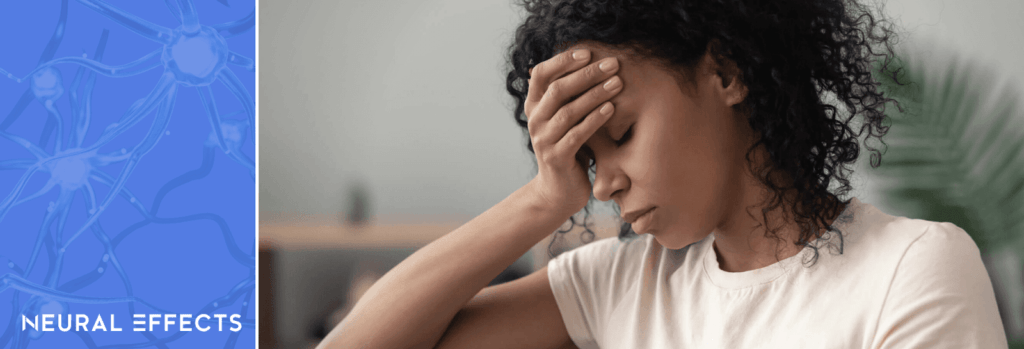Right after you’ve hit your head, you may wonder if it’s “bad enough” to be a concussion. Some people get symptoms like headaches and dizziness right away, but for others, it could take a day or two before any symptoms show up. Concussions aren’t the same for everyone.
Keep in mind that online resources — including this one — are no substitute for seeing a doctor. If there’s a chance you sustained a concussion or a more serious injury, seek medical help.
In this article, we’ll look at:
- The causes of a concussion
- The most common symptoms of a concussion, including which ones to worry about
- What to do if you think you have a concussion
- Concussion treatment at Neural Effects
- Frequently Asked Questions
If you live in Provo, Salt Lake City, or anywhere else in the Utah valley area, we can help you recover from your concussion and reduce your chance of long-term symptoms. We are in network for most types of medical insurance. Schedule your evaluation today.
What causes a concussion?

A concussion is a type of mild traumatic brain injury (TBI) caused by a direct blow to the head or by an indirect hit to the body that causes the brain to move rapidly back and forth inside the skull. That can include whiplash after a car accident, for example.
This sudden movement may cause the brain to bounce or twist, resulting in bruising, inflammation, and damage to blood vessels and brain cells, all of which affect how the brain works. Given that the brain is the body’s control center, the effects of a concussion can be felt anywhere in the body.
Some situations that either cause a concussion or increase your risk of getting a concussion include:
- Falls, especially in young children and older adults
- Contact sports, such as football, hockey, soccer, rugby, or boxing
- Any sports without proper safety equipment and supervision
- Motor vehicle collision
- Pedestrian or bicycle accident
- Involvement in combat or training for combat
- High-risk jobs, such as construction workers or firefighters
- Physical abuse
- Previous concussion(s)
What symptoms should I worry about?
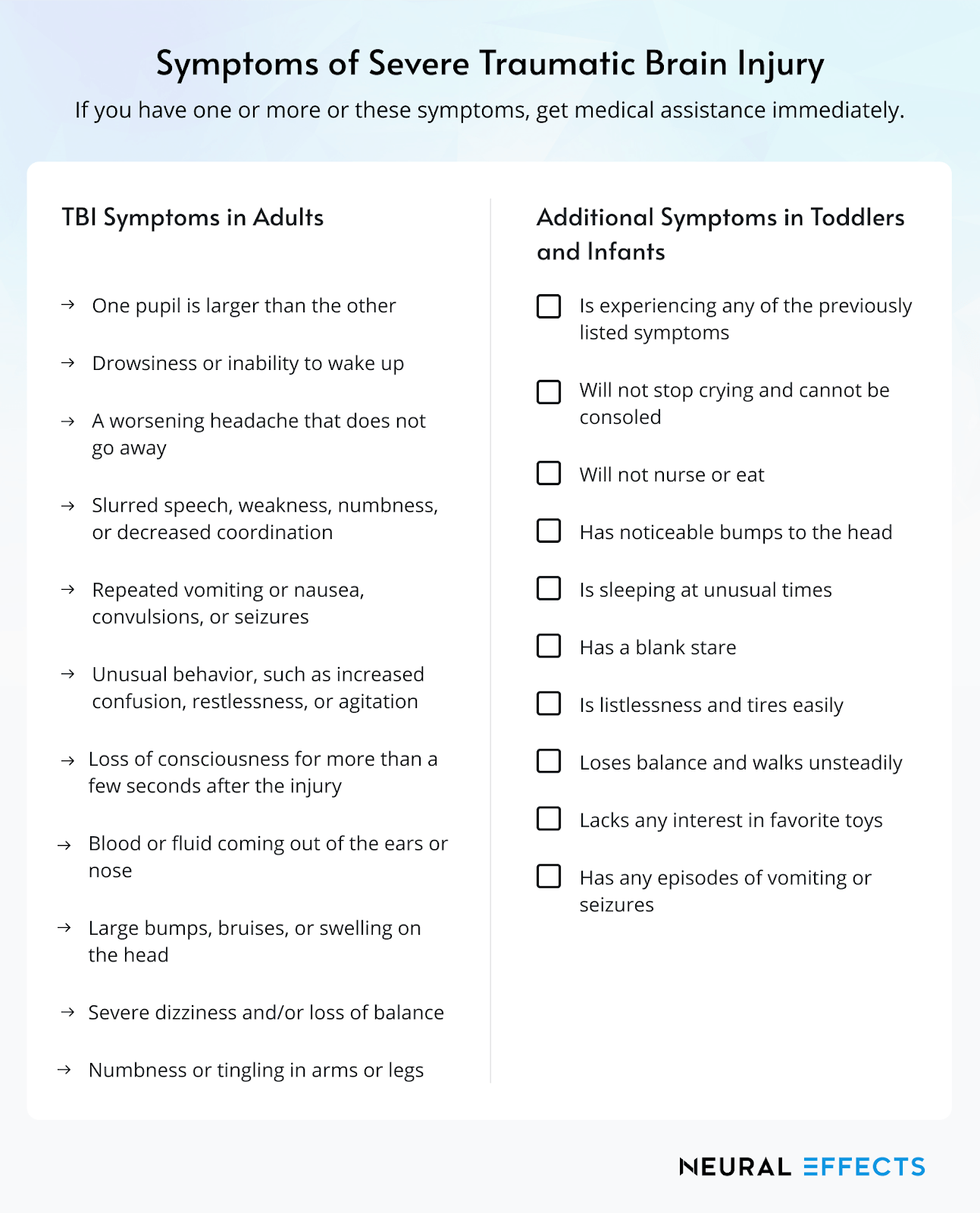
Not all concussions warrant a trip to the emergency room (ER). But if you experience any of the following symptoms, we recommend seeking medical attention immediately:
- One pupil is larger than the other
- Drowsiness or inability to wake up
- A worsening headache that does not go away
- Slurred speech, weakness, numbness, or decreased coordination
- Repeated vomiting or nausea, convulsions, or seizures
- Unusual behavior, such as increased confusion, restlessness, or agitation
- Loss of consciousness for more than a few seconds after the injury
- Blood or fluid coming out of the ears or nose
- Large bumps, bruises, or swelling on the head
- Severe dizziness and/or loss of balance
- Numbness or tingling in arms or legs
When you get to the hospital, ER healthcare professionals may order a CT scan or MRI scan. Brain imaging can detect whether your injury has caused brain swelling, bleeding, or a skull fracture, any of which may need surgical intervention.
Dangerous Symptoms in Toddlers and Infants
It’s common for infants and toddlers to hit their head. However, concussions can be difficult to recognize in young children because they can’t explain how they’re feeling.
After a head injury, you should go to the ER if your child:
- Is experiencing any of the previously listed symptoms
- Will not stop crying and cannot be consoled
- Will not nurse or eat
- Has noticeable bumps to the head
- Is sleeping at unusual times
- Has a blank stare
- Is listlessness and tires easily
- Loses balance and walks unsteadily
- Lacks any interest in favorite toys
- Has any episodes of vomiting or seizures
Dangerous Symptoms in Elderly Adults
Older adults may experience the same symptoms listed above, but concussions are often missed or misdiagnosed in this population. For example, if an elderly patient has a fall-related injury, such as a hip fracture, he or she may also have a concussion which can easily be missed during diagnosis.
In addition, older adults have a higher risk of severe complications after a concussion, including bleeding in the brain. If they already take blood thinners for other conditions, consult a health care provider immediately, even if they do not have any of the symptoms listed above.
What are the most common concussion symptoms?
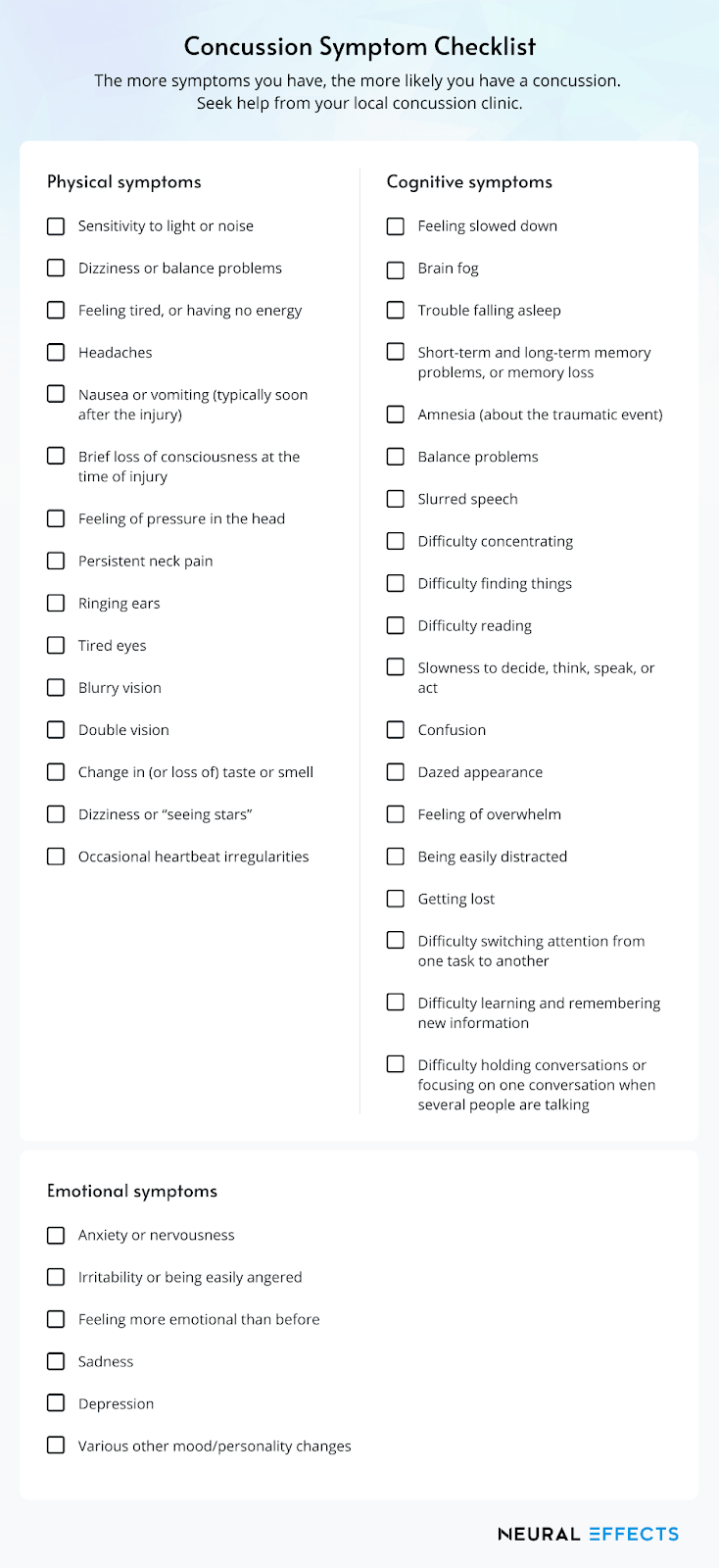
The signs of a concussion may not look like what you would expect and are often subtle.
These injuries can be challenging to diagnose because symptoms vary from person to person. In addition, some signs appear right after the injury, while others don’t manifest until a few hours or even days later.
You should also be aware that symptoms may change during your recovery. For example, you may have headaches for the first few hours, feel nauseated for a day or two, and then start to experience problems sleeping a week or two later. All of these symptoms can be related to your concussion.
Here’s a list of common symptoms of a concussion, broken down into three categories: physical symptoms, cognitive symptoms, and emotional symptoms.
Physical symptoms
Most (but not all) physical symptoms develop quickly after a head injury and may include:
- Sensitivity to light or noise
- Dizziness or balance problems
- Feeling tired or having no energy
- Headaches
- Nausea or vomiting (typically soon after the injury)
- Brief loss of consciousness at the time of injury
- Feeling of pressure in the head
- Persistent neck pain
- Ringing ears
- Tired eyes
- Blurry vision
- Double vision
- Change in (or loss of) taste or smell
- Dizziness or “seeing stars”
- Occasional heartbeat irregularities
Cognitive symptoms
Cognitive issues, on the other hand, may be harder to associate with the head injury as you may not notice them until a few days later. They may include:
- Feeling slowed down
- Brain fog
- Trouble falling asleep
- Short-term and long-term memory problems or memory loss
- Amnesia (about the traumatic event)
- Balance problems
- Slurred speech
- Difficulty concentrating
- Difficulty finding things
- Difficulty reading
- Slowness to decide, think, speak, or act
- Confusion
- Dazed appearance
- Feeling of overwhelm
- Being easily distracted
- Getting lost
- Difficulty switching attention from one task to another
- Difficulty learning and remembering new information
- Difficulty holding conversations or focusing on one conversation when several people are talking
Emotional symptoms
Emotional symptoms resulting from a concussion are even harder to spot because they’re more subjective than physical or cognitive symptoms. They’re extremely common post-concussion though, so don’t be afraid to ask for help if you notice a change in your emotional well-being after your injury. Emotional symptoms may include:
- Anxiety or nervousness
- Irritability or being easily angered
- Feeling more emotional than before
- Sadness
- Depression
- Various other mood/personality changes
Do you have a concussion?
It’s important to note that you might not experience all of the symptoms listed above if you have a serious brain injury. If you’ve been involved in any event where you suffered a direct or indirect hit to the head and you’re experiencing at least one symptom listed above, then there’s a good chance that you have a concussion.
If you’re still uncertain, try this quiz from our sister clinic, Cognitive FX:
Ultimately, if there’s any question that you might have a concussion, it’s best to get concussion testing done at a reputable clinic or medical office.
What should I do if I think I have a concussion?
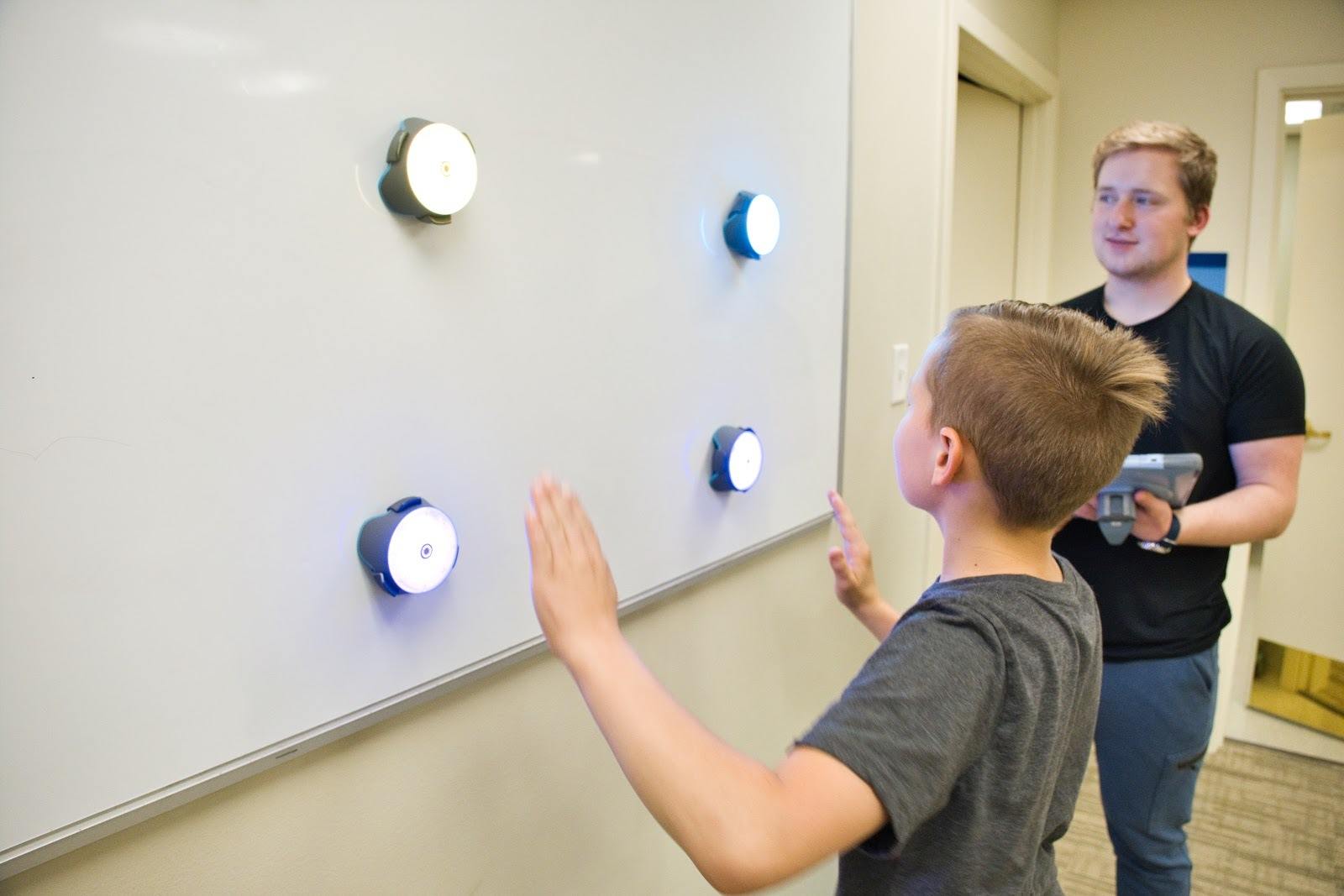
If you believe you have a concussion, seek medical care.
The best place to get specialized assistance is at a concussion clinic such as Neural Effects. Our team of specialists can offer you a more thorough evaluation than most ER and family doctors. We also provide therapy and educational resources.
To understand how the concussion has affected your brain function, we start by asking you to list your symptoms. To do this, we give you a checklist of symptoms, and you rate each one on a scale from zero (no symptoms) to six (severe symptoms). Some patients experience visual symptoms, such as blurry vision or difficulty focusing, while others refer to balance issues, such as dizziness or vertigo.
During our first meeting, we also review your medical history, which may influence how we treat your concussion. For example, if you have an old knee injury, we adjust our treatment plan to ensure that it will not make it worse.
For some patients, we may need to order a CT scan or an MRI scan to rule out bleeding in the brain or a skull fracture. If you’ve already had one of these scans before, bring it along with you, and we can review it as part of your medical history.
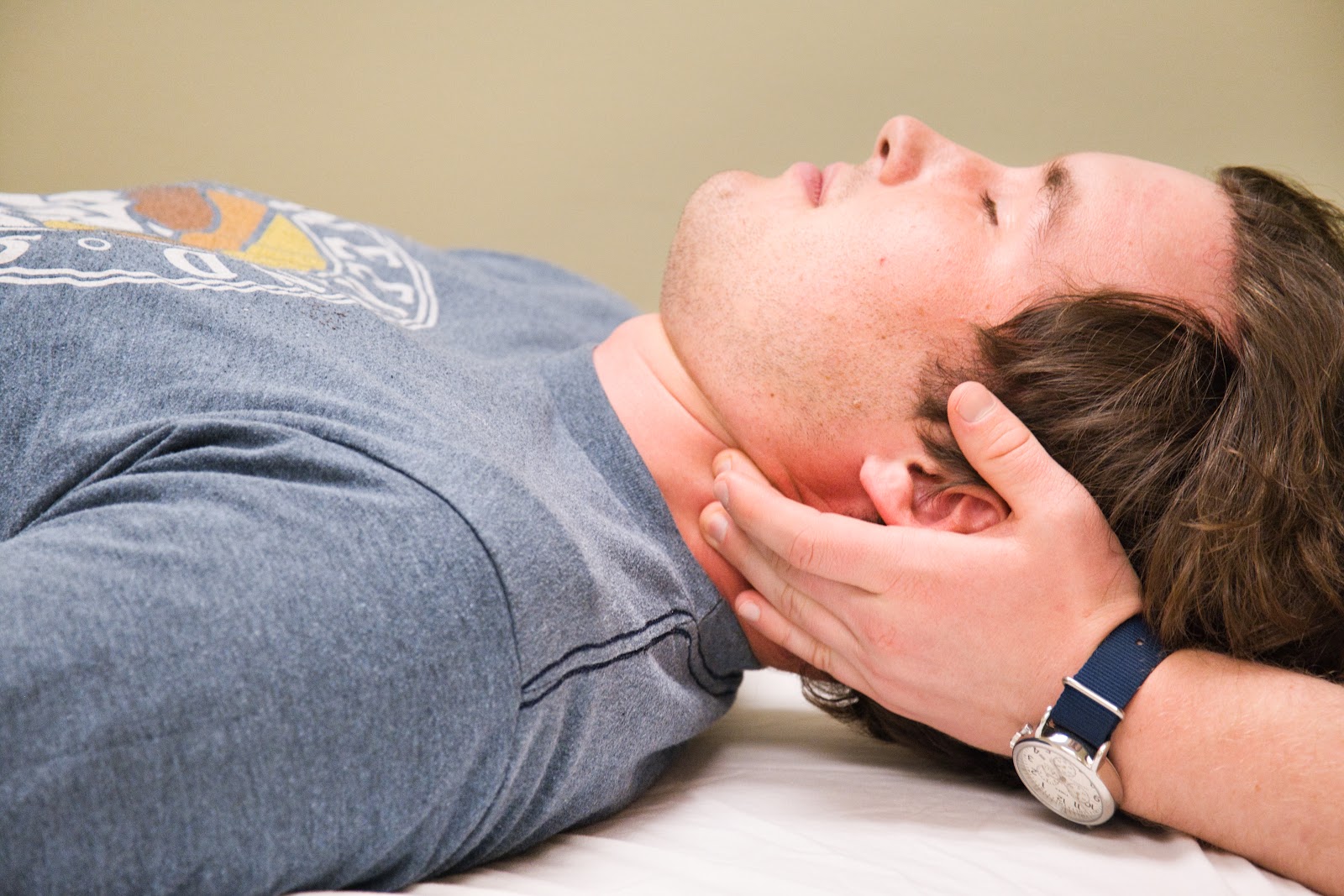
The next step involves a series of physical exams:
- Cranial nerve exam: This exam looks at facial muscles, eye movements, and a few other indicators to see if cranial nerves were affected by the concussion.
- Cervical spine exam: This involves palpation of the spine, neck, arms, and hands. Our therapists check for abnormalities suggesting a herniated disc or fracture.
- Balance assessment: We use a test called a Balance Error Scoring System test, where patients complete a series of tasks with their eyes closed. It’s essentially the same test used in the field if sports medicine doctors or athletic trainers suspect an athlete has suffered a concussion.
- Vision assessment: Vision problems are extremely common after a concussion. Our tests are designed to assess your peripheral vision, depth perception, ability to focus, and more.
- Muscle strength: We look at muscle strength on both sides of the body. Any large differences between the left and the right side could indicate a serious injury.
Once these exams are completed, our therapists gather all this information and plan your treatment.
Treatment at Neural Effects
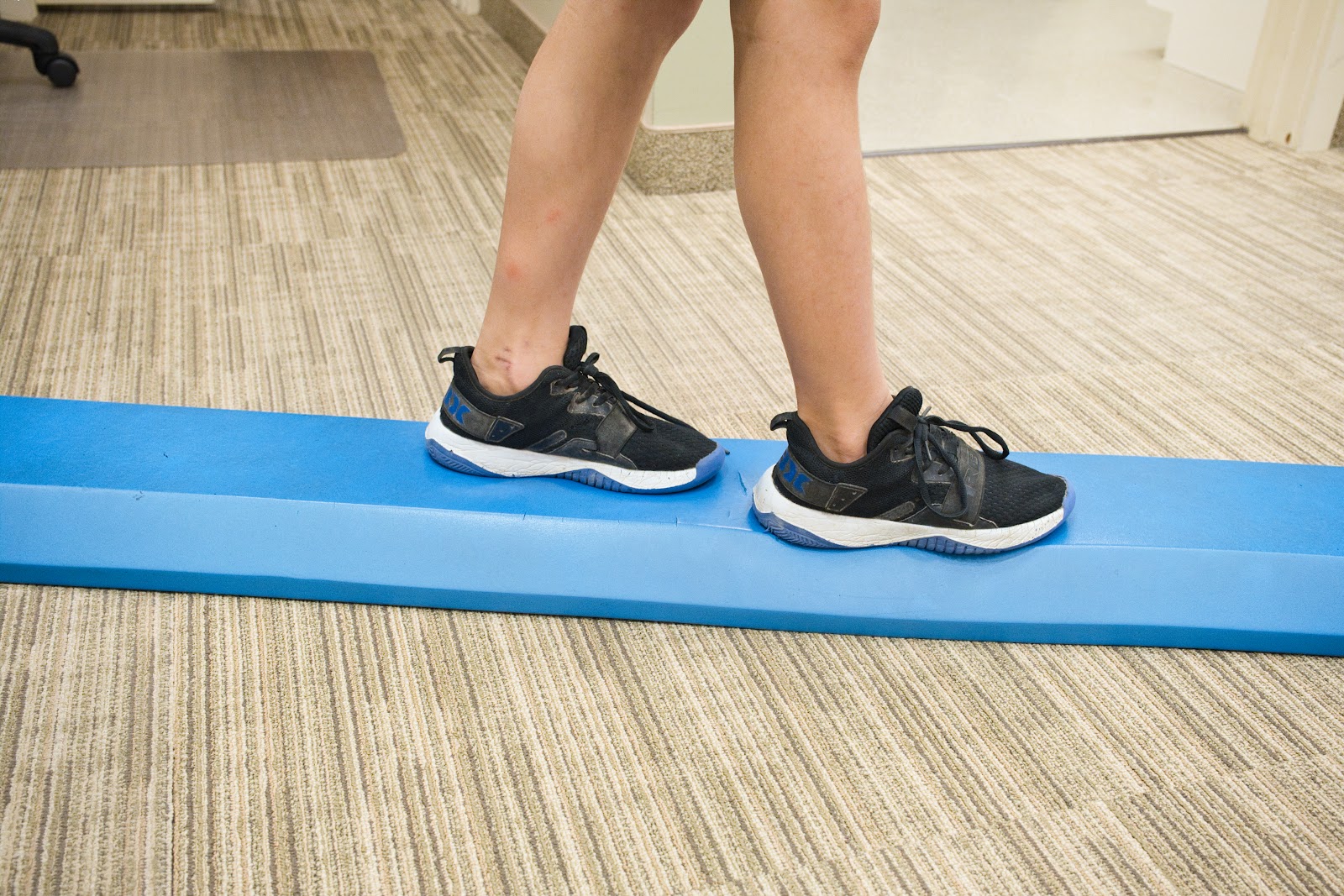
For a long time, the standard treatment for concussions was to stay in a dark room with minimal brain stimulation until symptoms subsided. This practice, known as cocooning, has proven to be ineffective and may even increase how long you take to recover.
At Neural Effects, we follow an active approach to concussion management using a combination of physical activity, breathing techniques, and additional types of therapies. The aim is to improve blood flow and communication pathways in the brain, especially in the affected areas. Studies show this approach maximizes your chances of a full recovery and reduces the risk of long-term symptoms.
We use a variety of therapies, including neuromuscular therapy, vision therapy, cognitive therapy, and physical therapy, among others. Our staff can track your progress to ensure that your sessions are challenging enough for your brain to benefit from, but not so hard that your symptoms spike.
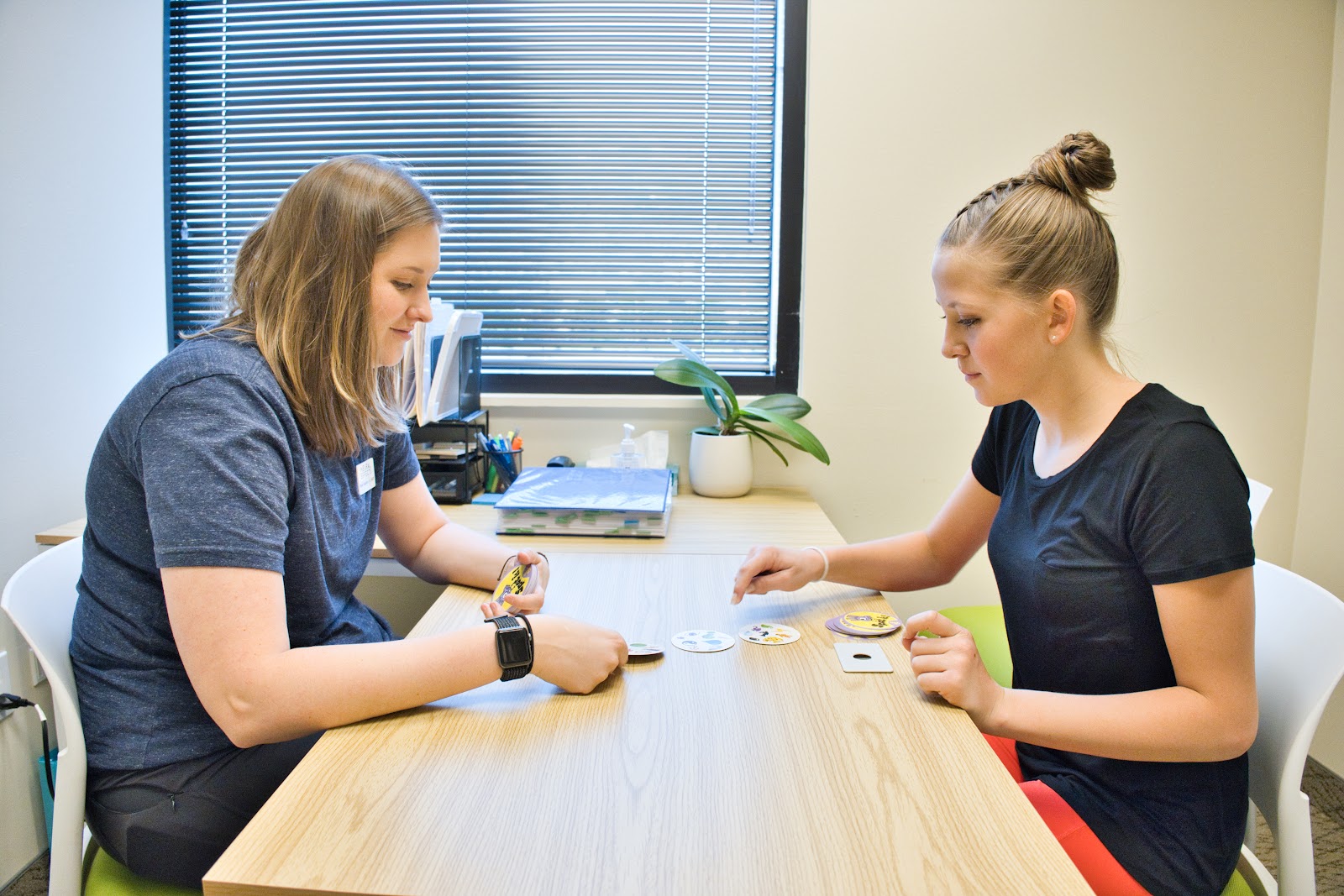
Typically, patients attend three sessions a week for two weeks. This timeframe can be adjusted according to each patient’s needs. After therapy sessions, our therapists will give you a list of resources to continue your concussion recovery at home.
We are one of the few clinics in the country to offer this combination of physical and cognitive therapies. You will find that most concussion clinics only offer physical therapy (which may or may not include vestibular and vision therapy) and don’t do cognitive therapy. While this approach is certainly better than no treatment at all, we’ve obtained more success combining both physical and cognitive therapies.
You can start treatment 48 hours after sustaining your injury. Most patients can start their treatment immediately after their initial appointment.
If you live in Provo, Salt Lake City, or anywhere else in the Utah valley area, we can help you recover from your concussion and reduce your chance of long-term symptoms. We are in network for most types of medical insurance. Schedule your evaluation today.
Frequently Asked Questions
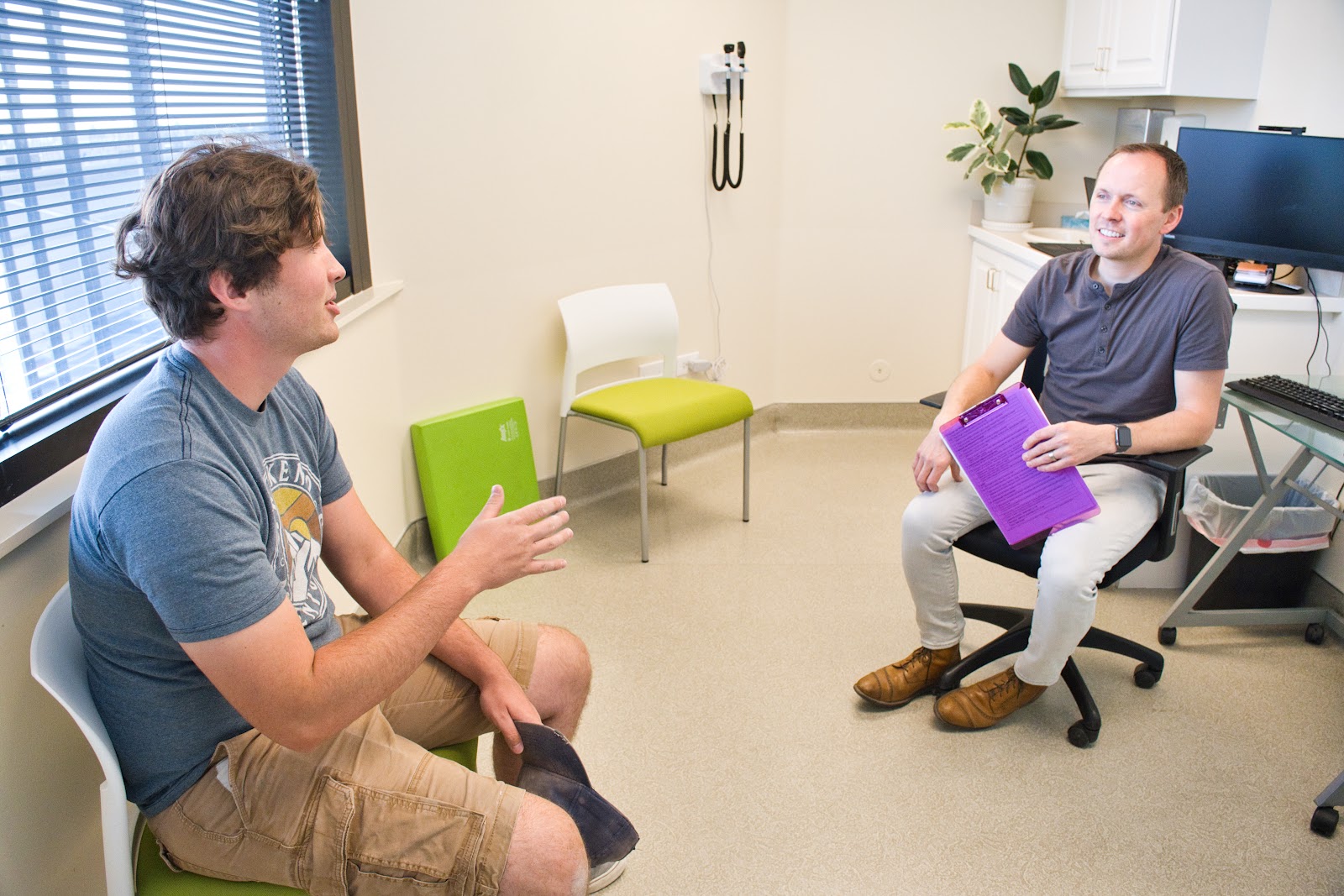
Do I have to lose consciousness to have a concussion?
One common myth is that you can’t have a concussion unless you’ve lost consciousness. The reality is that concussions happen even if patients don’t lose consciousness. In fact, less than 10% of concussions are accompanied by a loss of consciousness.
Many people also think that losing consciousness is a sign that it is a serious condition needing a long recovery period. Research shows that losing consciousness is not related to the severity of the injury or the length of recovery time.
Nevertheless, if a patient loses consciousness for more than a few seconds, it’s important to seek medical advice. If needed, ER doctors can check for skull fractures or brain bleeding, which can be life-threatening.
If I didn’t get hit in the head, can I still have a concussion?
Yes, concussions don’t occur just from direct hits to the head.
They can also result from an indirect blow somewhere else in the body that causes the brain to move rapidly back and forth inside the skull. Examples include sports injuries where two players collide or whiplash after a car collision (especially if you weren’t wearing a seat belt).
If I think I have a concussion, should I ask someone to wake me up at regular intervals?
No, this is another common myth about concussions.
Checking on a concussed loved one for a few hours after the concussion is important because that’s usually when serious symptoms develop, including feeling unusually drowsy. After that, patients need to be allowed to rest and sleep for the next 24-48 hours. Encourage them to avoid video games and any other visually or audibly busy activity during this period.
As the patient starts to recover — after this 48 hour rest period — it’s crucial to maintain regular sleep patterns to allow the brain to heal as they return to normal activities.
Can I take pain medication after a concussion?

Headaches are a common symptom after a concussion.
You can take over-the-counter acetaminophen (Tylenol) to manage the pain, but it’s advisable to wait a few hours after the injury until there’s no longer a high risk of developing a brain bleed.
Avoid other pain relief tablets that thin the blood, such as ibuprofen (Advil and Motrin), naproxen (Aleve), and aspirin for at least 12 hours after the concussion, as these medications significantly increase the risk of bleeding. If your symptoms are getting worse, we recommend that you go to the ER to rule out the possibility of a brain bleed.
Once concerns about a brain bleed are gone, any over-the-counter medications are okay to use for symptoms of a concussion.
What’s the difference between a concussion and a mild traumatic brain injury (mTBI)?
There is no difference between a concussion and a mild traumatic brain injury (TBI). They’re both names for the same condition. Doctors use both terms interchangeably.
My CT scan or MRI scan didn’t show anything. Can I still have a concussion?
Yes, you may still have a concussion because CT scans and MRI scans cannot detect a concussion. CT and MRI scans are excellent tools to detect structural changes after a head trauma, like a brain bleed or a skull fracture, but they cannot detect the functional changes in the brain that cause concussion symptoms, such as headaches and dizziness.
Can I return to sports immediately if I don’t think I’m concussed?
No, if there’s any chance you sustained a concussion in sports, then returning to play right away is extremely dangerous. If you sustain a second concussion within a few days of your first injury, you could develop second impact syndrome, a potentially life-threatening condition. You also put yourself more at risk for long-term symptoms.
My symptoms are not going away. What should I do?
If your symptoms don’t go away after a few months, you may have post-concussion syndrome (PCS).
If this is the case, you need specialized treatment to help your brain recover. In a healthy brain, nerve cells receive oxygen and nutrients from a network of blood vessels surrounding them. After a concussion, this connection doesn’t always work correctly, and some parts of the brain don’t receive what they need to function normally. This is called neurovascular coupling dysfunction.
Our sister clinic, Cognitive FX, offers a week-long treatment program to rehabilitate the brain when you’re suffering from the lingering effects of a concussion and restore normal vascular function. This is done by combining physical and cognitive exercises in an intense therapy regimen. Therapy is tailored for each patient based on their brain scan results.
If you live in Provo, Salt Lake City, or anywhere else in the Utah valley area, we can help you recover from your concussion and reduce your chance of long-term symptoms. We are in network for most types of medical insurance. Schedule your evaluation today.
